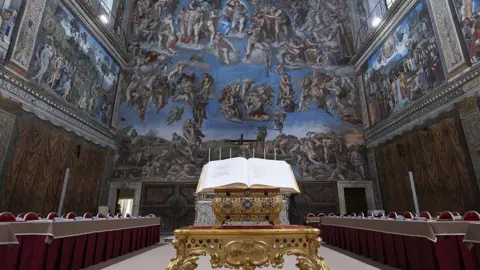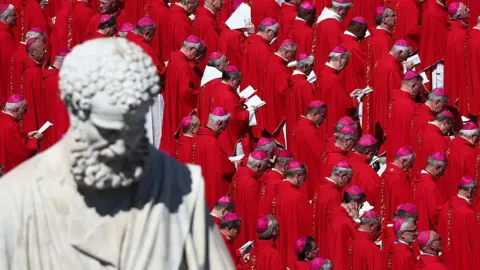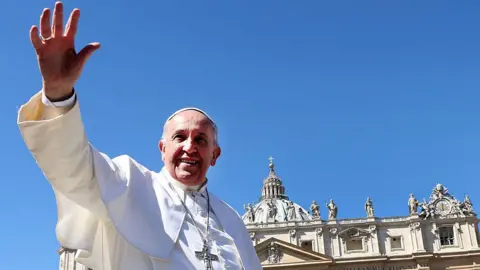Voting for new Pope set to begin with cardinals entering secret conclave
 VATICAN MEDIA / HANDOUT
VATICAN MEDIA / HANDOUTOn Wednesday evening, under the domed ceiling of Michelangelo's Sistine Chapel, 133 cardinals will vote to elect the Catholic Church's 267th pope.
The day will begin at 10:00 (09:00 BST) with a mass in St Peter's Basilica. The service, which will be televised, will be presided over by Giovanni Battista Re, the 91-year-old Cardinal Dean who was also the celebrant of Pope Francis' funeral.
In the early afternoon, mobile signal within the territory of the Vatican will be deactivated to prevent anyone taking part in the conclave from contacting the outside world.
Around 16:15 (15:15 BST), the 133 cardinal electors will gather in the Pauline Chapel and form a procession to the Sistine Chapel.
All the while they will be singing a litany and the hymn Veni Creator - an invocation to the Holy Spirit, which is seen as the guiding hand that will help cardinals choose the new Pope.
Once in the Sistine Chapel, one hand resting on a copy of the Gospel, the cardinals will pronounce the prescribed oath of secrecy which precludes them from ever sharing details about how the new Pope was elected.
When the last of the electors has taken the oath, a meditation will be held. Then, the Master of Pontifical Liturgical Celebrations Diego Ravelli will announce "extra omnes" ("everybody out").
He is one of three ecclesiastical staff allowed to stay in the Sistine Chapel despite not being a cardinal elector, even though they will have to leave the premises during the counting of the votes.
The moment "extra omnes" is pronounced marks the start of the cardinals' isolation – and the start of the conclave.
The word, which comes from the Latin for "cum clave", or "locked with key" is slightly misleading, as the cardinals are no longer locked inside; rather, on Tuesday Vatican officials closed the entrances to the Apostolic Palace – which includes the Sistine Chapel- with lead seals which will remain until the end of the proceedings. Swiss guards will also flank all the entrances to the chapel.
 Getty Images
Getty ImagesDiego Ravelli will distribute ballot papers, and the cardinals will proceed to the first vote soon after.
While nothing forbids the Pope from being elected with the first vote, it has not happened in centuries. Still, that first ballot is very important, says Austen Ivereigh, a Catholic writer and commentator.
"The cardinals who have more than 20 votes will be taken into consideration. In the first ballot the votes will be very scattered and the electors know they have to concentrate on the ones that have numbers," says Ivereigh.
He adds that every other ballot thereafter will indicate which of the cardinals have the momentum. "It's almost like a political campaign… but it's not really a competition; it's an effort by the body to find consensus."
If the vote doesn't yield the two-third majority needed to elect the new pope, the cardinals go back to guesthouse Casa Santa Marta for dinner. It is then, on the sidelines of the voting process, that important conversations among the cardinals take place and consensus begins to coalesce around different names.
According to Italian media, the menu options consist of light dishes which are usually served to guests of the residence, and includes wine – but no spirits. The waiters and kitchen staff are also sworn to secrecy and cannot leave the grounds for the duration of the conclave.
 Getty Images
Getty ImagesFrom Thursday morning, cardinals will be taking breakfast between 06:30 (05:30 BST) and 07:30 (06:30 BST) ahead of mass at 08:15 (07:15 BST). Two votes then take place in the morning, followed by lunch and rest. In his memoirs, Pope Francis said that was when he began to receive signals from the other cardinals that serious consensus was beginning to form around him; he was elected during the first afternoon vote. The last two conclaves have all concluded by the end of the second day.
There is no way of knowing at this stage whether this will be a long or a short conclave – but cardinals are aware that dragging the proceedings on could be interpreted as a sign of gaping disagreements.
As they discuss, pray and vote, outside the boarded-up windows of the Sistine Chapel thousands of faithful will be looking up to the chimney to the right of St Peter's Basilica, waiting for the white plume of smoke to signal that the next pope has been elected.
